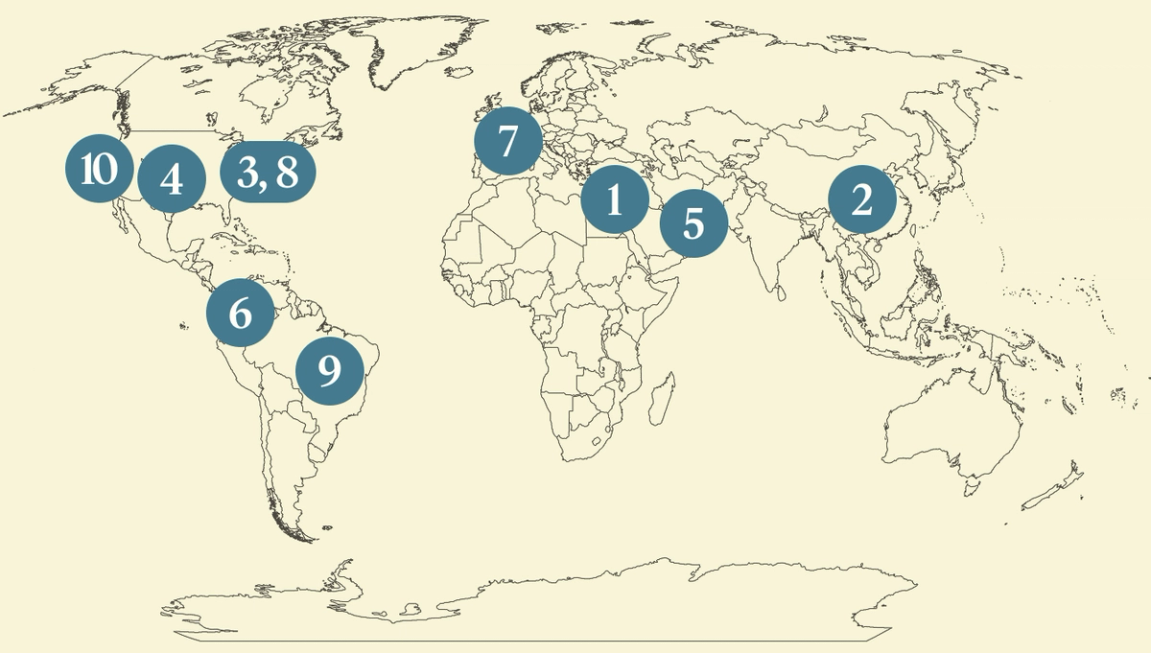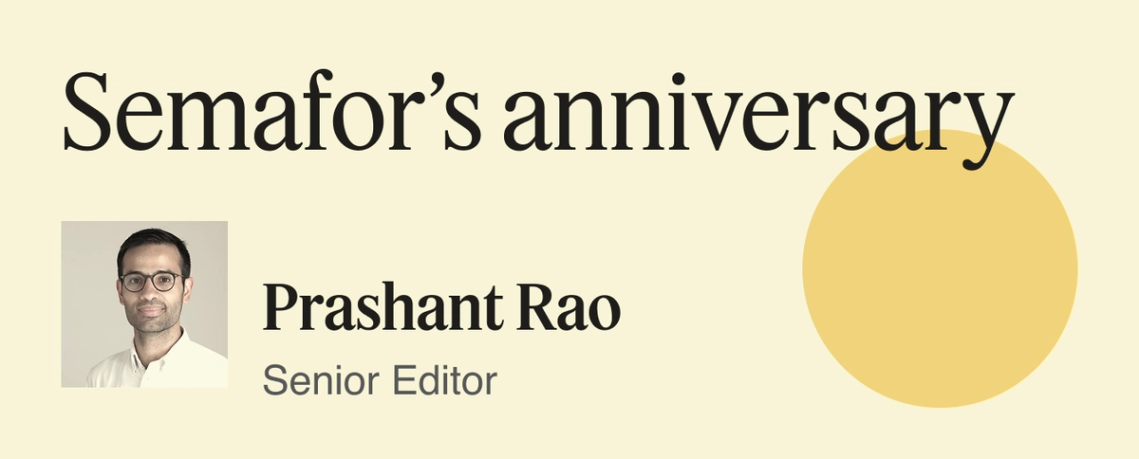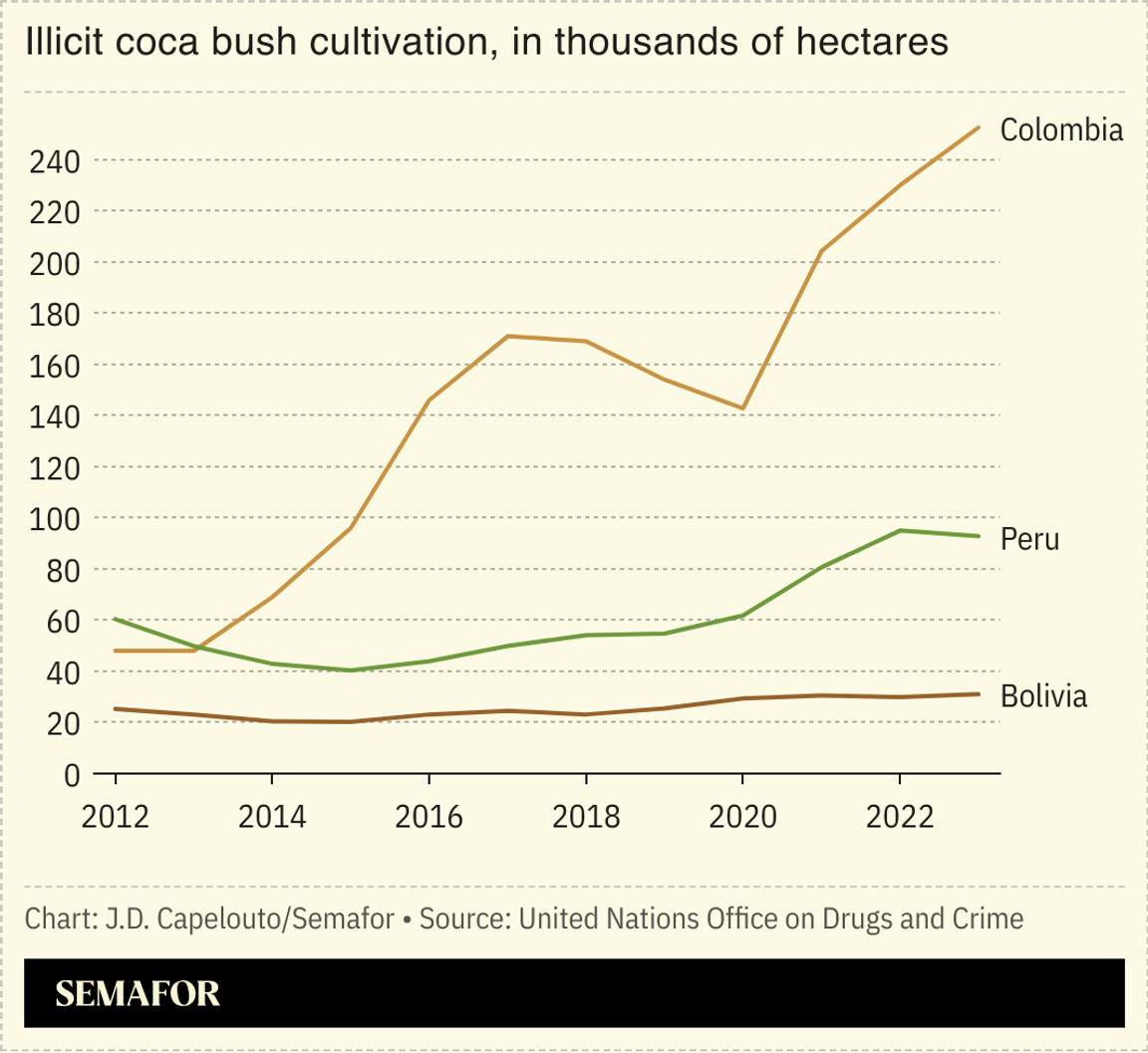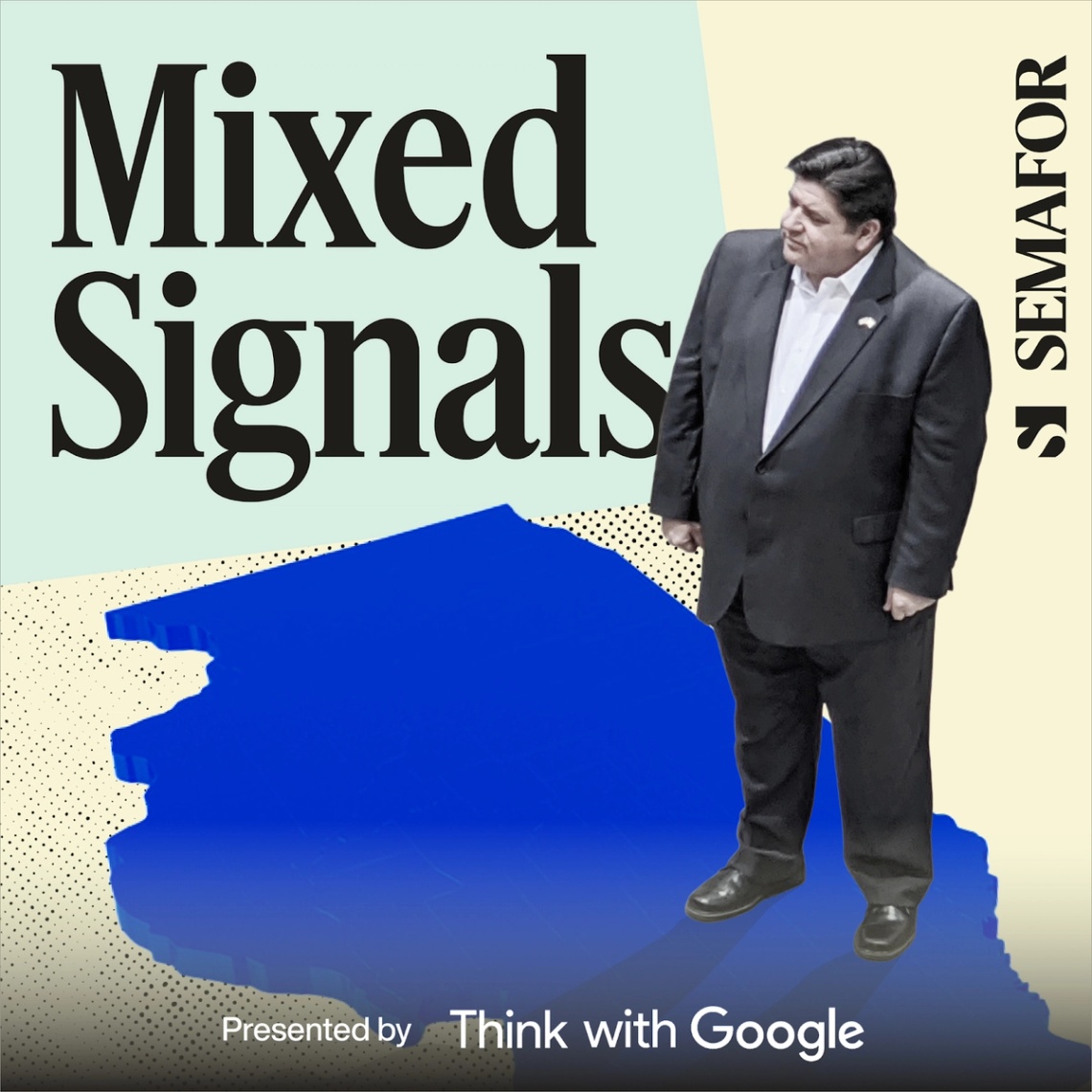| | The Israel-Hamas ceasefire faces its first major test, China’s leaders gather to set a five-year pol͏ ͏ ͏ ͏ ͏ ͏ |
| |  | Flagship |  |
| |
|
The World Today |  - Major test of Gaza truce
- China sets policy agenda
- US private credit turmoil
- ‘No Kings’ protests
- Afghanistan-Pakistan deal
- Trump’s Colombia threats
- Brazen Louvre heist
- Expanding stock market
- Sleep is a spectrum
- Glut in US wine country
 Engravings offer clues to ancient human history in a Saudi desert, and Semafor’s tech editor on the AI safety debate. |
|
 Dear Flagship reader, This weekend marks three years of Semafor. We launched into a disorienting, polarized media landscape, and set out to offer an antidote: journalism that’s global, transparent, and curious. We wanted to wade through the noise to provide you with rich, concise briefings about an increasingly complex world. Three years in, we’re immensely proud of what we’ve built. Our briefings delve into business, energy, media, and technology, with regional editions focused on Africa, the Gulf, and the US — and more to come, including Semafor China. We’ve broken huge stories and convened agenda-setting gatherings, all in service of delivering intelligence for the new world economy. Flagship is at the core of this mission, to connect the dots and arm you with the knowledge you need to navigate the immense challenges and opportunities around us. Now we’re entering a new phase of growth at Semafor and we’re eager to make Flagship more essential, more sophisticated, more urgent. For that, we need your help: Please write to me and tell me about what you think of us. What do you need in your daily briefing? What could we do better? What do you wish you saw more (or less) of? I’m grateful for your support, guidance, and belief in us. The year ahead will be an exciting one — thank you for joining us along the way. Prashant Rao Senior Editor, Semafor |
|
 Amir Cohen/Reuters Amir Cohen/ReutersIsrael carried out strikes in Gaza on Sunday after saying militants opened fire on its troops, violating a fragile ceasefire. The clashes marked the first major test of the US-brokered truce that went into effect just over a week ago, but the situation in the enclave had been fraught before Sunday. Hamas has sought to reassert control, sparking conflict with its rivals. Washington is now scrambling to save the peace deal: Israel said it would resume enforcing the ceasefire and sending aid into Gaza following pressure from the Trump administration, Axios reported. “The next 30 days are going to be critical… We are going to be calling the shots,” one senior US official said. |
|
China’s leaders set policy course |
 Florence Lo/Reuters Florence Lo/ReutersChina’s top leaders convene this week to set the country’s policy agenda for the next five years, with far-reaching implications for global markets. The Chinese Communist Party Central Committee’s four-day “Fourth Plenum” comes as trade tensions with the US flare and China grapples with deflation and tepid spending, even as stocks have boomed. Chinese leader Xi Jinping is likely to double down on state-supported innovation and industry, as Beijing’s economic agenda prioritizes security over growth amid rising geopolitical volatility, an expert wrote for the Lowy Institute: “For foreign businesses and governments, the signal is blunt. Xi is staying the course on industrial self-reliance, even if it causes overcapacity and strains global trade ties.” |
|
Private credit market worries rise |
 Brendan McDermid/Reuters Brendan McDermid/ReutersUS investors, banks, and economists are increasingly worried about volatility in the private credit market following several major meltdowns and high-level warnings. Regional bank shares whipsawed last week after two lenders disclosed allegedly fraudulent loans; that followed the bankruptcies of car parts supplier First Brands and auto lender Tricolor, both of which are reportedly facing federal probes. “When you see one cockroach, there are probably more,” JPMorgan CEO Jamie Dimon warned. US private credit worries rattled global markets, while economists are concerned the turmoil signals broader consumer stress. Others appear more sanguine: Carlyle Group’s CEO said it’s on his “worry list,” but other economic conditions are holding up, while a Moody’s executive said: “One cockroach does not a trend make.” |
|
‘No Kings’ split-screen in US |
 Daniel Cole/Reuters Daniel Cole/ReutersMillions of Americans on Saturday protested against what they say is a government on the cusp of authoritarianism, as the vice president showed off the country’s military power in California. The two scenes — “No Kings” demonstrations across the country, and a mock Marine beach assault involving live howitzer fire — formed a “revealing split-screen” that underscored the fractured nature of US politics, The New York Times reported. Democrats are alarmed over President Donald Trump’s use of the military in domestic issues, but Republicans seem increasingly happy with his “imperial presidency,” Semafor’s David Weigel wrote. Trump responded mockingly to the demonstrations with an AI-generated video that showed him flying a jet labeled “King Trump” and dumping brown liquid on protesters. |
|
Qatar brokers another ceasefire |
 Qatar Ministry Of Foreign Affairs/Handout via Reuters Qatar Ministry Of Foreign Affairs/Handout via ReutersAfghanistan and Pakistan agreed to a ceasefire on Sunday after a week of border clashes that killed dozens. Islamabad had accused Kabul’s Taliban government of providing a refuge for militants that conduct cross-border attacks. Qatar mediated the peace talks alongside Turkey, in what was the latest indication of Doha’s growing influence as a trusted middleman in global conflicts. Qatar was central to the Israel-Hamas talks, and helped end the brief conflict between Iran, Israel, and the US earlier this year. The gas-rich Gulf nation has mediation enshrined in its constitution, but it walks a geopolitical tightrope: While serving as an Israeli-endorsed intermediary and close US ally, it also provides aid to groups like Hamas. |
|
Trump escalates spat with Colombia |
 US President Donald Trump on Sunday said he would cut aid to Colombia, accusing its left-leaning leader of being an “illegal drug dealer.” Tensions were already high over the White House’s criticism of President Gustavo Petro’s attempts to curb drug trafficking, threatening the countries’ close security and commercial relations. The spat stems from Trump’s aggressive approach to cutting off the flow of drugs from Latin America to the US: Petro had criticized the US for striking a boat in Colombian waters. Petro has sought to negotiate with Colombian guerrilla groups, but the strategy has so far failed to reduce violence or cocaine production, Bloomberg wrote. Cocaine is booming globally, with most of the drug originating from Colombia. |
|
Crown jewels stolen from Louvre |
 Gonzalo Fuentes/Reuters Gonzalo Fuentes/ReutersA group of thieves broke into the Louvre Museum in Paris on Sunday, making off with what French officials described as “priceless” jewelry. The robbery, which occurred over four minutes in broad daylight while the museum was open to the public, targeted the museum’s Galerie d’Apollon, which holds what remains of France’s crown jewels. Le Parisien reported that the crooks made off with nine pieces of Napoleon’s and the monarchy’s jewelry collection; on Sunday, only one item had reportedly been found — the Empress Eugenie’s crown. It is not the first time the museum has been robbed: An Italian man stole Leonardo da Vinci’s Mona Lisa in 1911, apparently in order to repatriate it to Italy. |
|
 Chicago is either a war zone quickly spiraling out of control, or a peaceful city under siege by an overreaching federal government. It all depends on who you ask — and which channel you watch. This week, Ben and Max bring on Illinois Gov. JB Pritzker to talk about how he’s fighting a messaging battle against the Trump White House. They also talk about how conservative media is shaping the situation on the ground, what he thinks of California Gov. Gavin Newsom’s trolling approach to Trump, and whether we should bet on the Chicago Bears. |
|
Democratizing the stock market |
 Brendan McDermid/Reuters Brendan McDermid/ReutersMore small-time investors are entering the stock market, driven by a combination of a share boom and regulatory loosening that one journalist argued is reminiscent of 1929. Before the Great Depression, Wall Street figures pushed to democratize investment, to let “the little fellows” enjoy the boom, The New York Times’ Andrew Ross Sorkin wrote; now, people like Robinhood’s CEO are similarly arguing for crypto and private equity to be more accessible. And like 1929, the government is rolling back limits on who can buy and sell shares. But protections have not kept pace, noted Sorkin, who has a new book about the 1929 crash: “Whenever access expands faster than safeguards, charlatans rush in and ordinary investors are often left holding the bag.” |
|
|